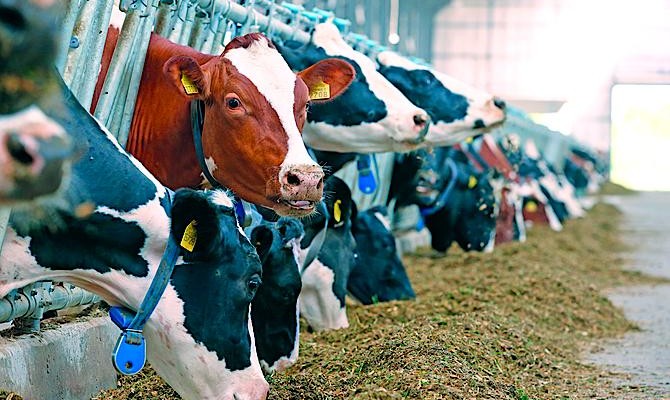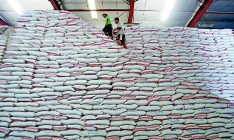Economy
trade warRussia is seeking new reasons to blockade Ukrainian products

Yesterday a ban was imposed on the export of Ukrainian dairy products to Russia, which is their largest market. The reason was that antibiotics, metal salts and prohibited micro-organisms were found by the Russian Rosselkhoznadzor (Federal Service for Veterinary and Phytosanitary Surveillance of Russia). Last year the service registered 37 cases of discovery of dangerous substances in Ukrainian dairy products and in the first half of 2014 this figure grew to 196. “Having analyzed those risks that have recently increased, we came to the conclusion that our Ukrainian colleagues do not have control over the situation concerning the use of antibiotics and other hazardous substances. It seems as though the path of antibiotics getting into other dairy products begins with dry milk and dry serums in which the concentration is increasing tenfold,” said Head of Rosselkhoznadzor Sergei Dankvert.
The Ukrainian side represented by the Minister of Agrarian Policy and Food Ihor Shvaika claim that the decision of Russia is politically motivated. The Department of Veterinary Medicine (DerzhVetPhytoSluzhba - DVPS) has already begun holding consultations with the Russian side. “In every case investigations will be held to expose violations,” Press Secretary of the DVPS Anatoliy Osadchiy told Capital.
Production is in decline
The Russian market is a priority for Ukrainian dairy farmers. According to data of the Ministry of Revenue and Duties, in H1 2014 a total 84.61% of Ukrainian butter (US $19.89 mn), 75.43% of Ukrainian cheese (US $78.56 mn), 13.95% of milk and condensed milk (US $7.75 mn) and 29.81% of dairy serum (US $5.07 mn) were exported to Russia. Based on last year’s results, the revenues from exports of Ukrainian dairy products to Russia amounted to US $374 mn. In the first half of 2014 dairy products totaling US $113 mn in value were exported to Russia, which is a third lower than in the same period of the previous year.
The closing of the largest market of dairy products will have a negative impact on the Ukrainian producers. Chairman of the Board of Directors of the Union of Dairy Enterprises of Ukraine Vadym Chaharovskiy noted that this year some companies, in particular Terra-Food, Molochniy Allians and Milkiland-Ukraina, have already begun reducing the production of cheese and increasing the production of other sorts of dairy products. “Production of fatty cheese this year fell by 20% compared to last year’s indicators, while the production of butter grew 34% and the output of dry fat-free milk increased by 52%,” expert of the Ukrainian Agrarian Business Club Alina Zharko confirmed.
Bets on diversification
In order to minimize the losses from the Russian blockade, Ukrainian dairy farmers must reorient their production of cheese for Russia to butter and dry milk for other markets, Zharko believes. She says for butter this could be traditional markets of Moldova, Armenia, Azerbaijan and underdeveloped markets in Asia to where this product is being supplied, though in small volumes (for example, Jordan). The supplies of dry milk have better prospects from the vantage point of logistics. “The sales markets of countries of the CIS and Asia, as well as African countries such as Algeria and Egypt are quite attractive,” Zharko specified. Chief Executive of Milkiland N.V. Anatoliy Yurkevych agrees with Zharko. “Despite certain problems that the decision of Rospotrebnadzor (the Russian Consumer Oversight body) created for us, Milkiland can fulfill its financial obligations through diversification of our business,” Yurkevych assured.
General Director of the Center for Improving the Efficiency of Animal Husbandry Mykola Babenko noted that the Russian market has always been attractive and more accessible than the EU market for Ukrainian milk. “The shortage of milk in Russia is more than 9 mn t, while the production cost and the price of raw milk in Russia are higher than in Ukraine. Dairy producers in Europe or Belarus may substitute Ukrainian milk producers in Russia,” he presumes.
The European market could become an alternative to the Russian market, but for this it is necessary to harmonize Ukrainian legislation with EU quality standards, says Vice President of the Association of Milk Producers Denys Marchuk.
Diversification of supplies and re-equipping of technological lines take from several months to several years. “Over this period of time it is possible that the prices of milk will drop,” Marchuk presupposes.
Zharko says the demand for raw milk will also fall, but if processing plants quickly change the geography of their supplies and technology, the drop in the retail prices of milk may be insignificant. On the flipside, the decrease in demand and cheaper milk will lead to a steady decline in the head count of cattle.
Invasion of the corn beetles
Russia’s banning of Ukrainian agricultural products has been quite regular since 2009. For example, in 2012 Ukrainian cheese producers were accused of failing to comply with production technology. But the investigation did not expose any violations and after two months the supplies of Ukrainian cheese to Russia were renewed.
Yurkevych believes that Ukrainian cheese producers lost more than US $45 mn in profits. The trade war was launched a year ago, when Russia banned the import of Ukrainian confectionery goods produced by Roshen. From that moment potatoes and pork fell under the Russian embargo.
However, Russian officials are not planning to stop at what they have already achieved. The supplies of fruits and vegetables, as well as canned fish from Ukraine have been prohibited starting today. Dankvert says within two weeks Russia plans to place a ban on crop plants from Ukraine. He says the reason for such a decision is the spread of corn flea beetles in Ukraine and countries of the European Union.

EuroChem lost the case. From now on there will be no Russian nitrate fertilizer in Ukraine
111551
Ukraine's Deputy Energy Minister Ulyda dismissed for okaying electricity imports from Russia
1 23757
Russian steelmakers jostle Ukrainian steelworks abroad as the latter are suffering a serious decline in output
85817



 of the agreement of syndication with Financial Times Limited are strictly prohibited. Use of materials which refers to France-Presse, Reuters, Interfax-Ukraine, Ukrainian News, UNIAN agencies is strictly prohibited. Materials marked
of the agreement of syndication with Financial Times Limited are strictly prohibited. Use of materials which refers to France-Presse, Reuters, Interfax-Ukraine, Ukrainian News, UNIAN agencies is strictly prohibited. Materials marked  are published as advertisements.
are published as advertisements.